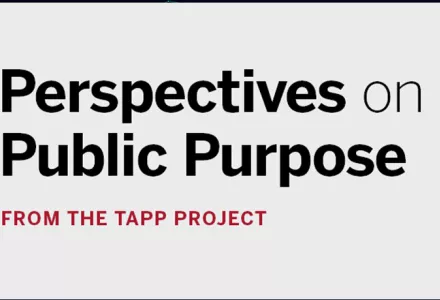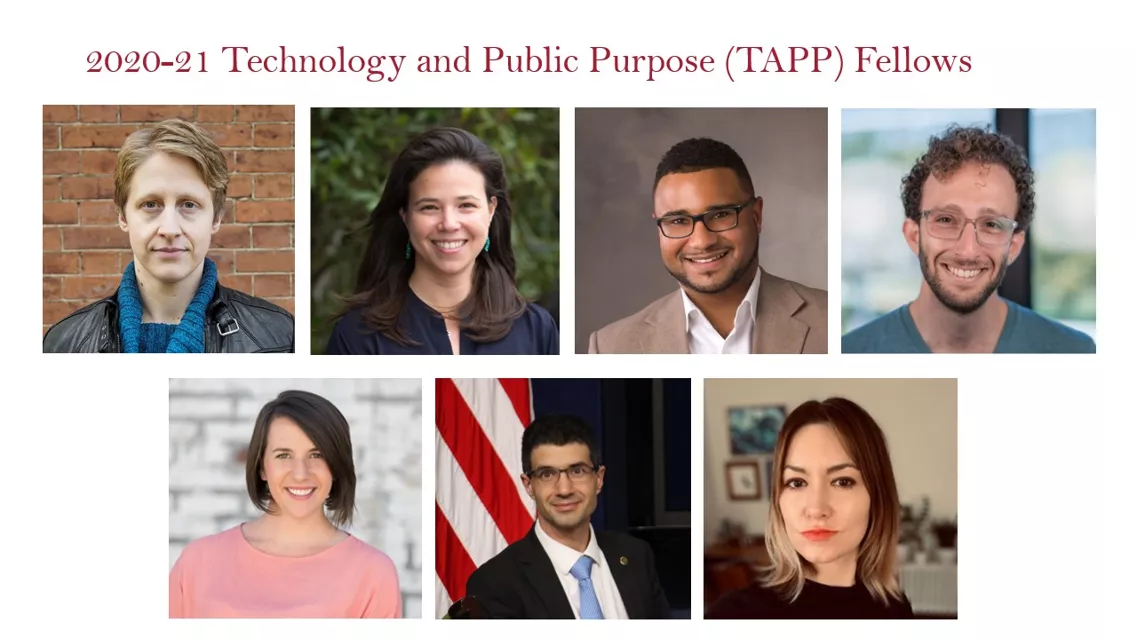Sessions
The following seven online series will engage audiences in conversations on a wide variety of public purpose issues including: health, surveillance, science and technology policy among many others.
Monday, April 26th
The past year was unlike any other. The COVID-19 pandemic, Black Lives Matter movement, and Capitol riots were all extraordinary events--ones that forced us to confront long standing issues of race, equity, accessibility, democracy, and more. We also confronted the role of technology in both helping and harming public causes.
These past 12 months serve as a case study for technology and public purpose, forcing us to examine the immense benefits and critical harms of technologies in our daily lives. As the kickoff to the Perspectives of Public Purpose Week, Belfer Center and TAPP Faculty Director and the 25th U.S. Secretary of Defense Ash Carter will moderate a discussion with our inaugural cohort of TAPP fellows on how tech has both helped and hindered progress in 2020, and what lessons we’ve learned moving forward.
In this fireside chat, former U.S. CTO Michael Kratsios will discuss his perspectives on the tools that matter most in enabling effective outcomes in science and technology for the benefit of the citizens of the United States. The focus will be on challenges and opportunities unique to emerging technologies. Two key themes will be explored. One considers the challenges in balancing the novel and positive outcomes from exploration and innovation with their potential negative externalities and risks, both societal and national. The other examines techniques, from stakeholder convenings to consortia to legislation, that can help accelerate technology and science progress while ensuring that the public’s interest and purpose in the outcomes are included. TAPP Fellow Jake Taylor will host.
Following the chat at 12:45 PM, Dr. Jennifer Shieh, Chief Scientist at the Small Business Administration, will join Jake to lead a discussion regarding the investment and innovation tools available that help the government and the private sector work towards technology development with a public purpose.
New technologies are having a profound impact on roads, bridges, and highways across the country. To ensure safety remains paramount during this transformational time, the benefits and consequences of these technologies need to be managed to ensure all road users share the roads responsibly. This conversation will feature 3 fellows working at the intersection of technology and transportation policy as they share their experiences and knowledge on current trends in the sector that will change the ways Americans move themselves and goods through 2030.
The decisions venture capital make do not just impact LPs, founders, or customers. The decisions to fund and support various types of technology or innovation impact everyone in society. Venture backed startups affect how we work, live, and move; they impact jobs, the environment, the economy, democracy, human rights, privacy, and safety. VC is risky in more ways than just high failure rates and intense growth models. These investors have massive responsibility in how our society is shaped and rarely are they held accountable for the negative aspects of those outcomes.
Join Technology and Public Purpose fellow Liz Sisson for an overview and discussion of her research on evaluating early-stage startups for business and public risks related to the environment, economic inequality, labor, privacy and more. She will also demonstrate her team’s Public Purpose Indicator tool, built for venture capital groups and startups to be used in diligence.
On January 22, 2021 President Biden issued an executive order calling for the modernization of public health data infrastructures. The COVID-19 pandemic has brought to global attention not only key challenges facing the public sector in the generation of timely and accurate data, but also the need to grapple with the governance of data collected or leveraged for public health. Whose data counts? How do the increasingly blurred distinctions between research, clinical care, and public health practice support or challenge data sharing across sectors? This panel will draw on the groundbreaking work of four practitioners to imagine what the design of trustworthy data systems for 21st century public health should entail.
Sex is a universal human interest. Even if you’re not personally involved, it still impacts your life in many ways. Accurate information and a variety of positive examples are essential for a healthy society, and the internet is an excellent distribution method. Some of the sexual content online is undeniably bad, but how do we make sure the good stuff is protected?
Clare will review her research findings and then be joined by asexuality author Angela Chen, sex and disability expert Robin Wilson-Beattie, and sex education cartoonist Erika Moen for a panel on the importance of accessing information and finding community on the internet.
As part of the "Perspectives of Public Purpose Week", this panel will focus on how the U.S. federal government should tackle key technology problems through significant growth of the technical government workforce. We will hear from current and former government leaders in Technology and Human Capital, and discuss the challenges and opportunities the new administration has in hiring, retaining, and leveraging technologists in government agencies. We will explore why agency leadership should prioritize in-house tech human capital, unpack the resources they have available to do so, and re-imagine the outcomes of Government IT should they be able to accomplish this.
The term "smart city" surfaced more than 20 years ago as an umbrella term to describe a large and varied set of emerging technologies pitched to help cities operate more efficiently. Since then, this group of technologies has come to include location tracking, facial recognition technology, and many other privacy-invasive data collections. Should we be worried? As part of the "Perspectives of Public Purpose Week", in this video seminar, TAPP Fellow, Rebecca Williams, in conversation with public advocates, describes the risks at play and what we can do to prevent them.




